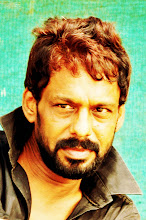Look, this is a fairy tale.
I believe in fairy tales more than I believe in God. Don’t you know that all the time a prince will come to save the maiden who was put in solitary confinement?
Those who detest stories will be sceptical about it.
I had a sister who used to laugh when someone said the celestial lover is an illusory construct. Those who have a personal celestial lover know that he is a more comforting presence than a lover or a husband.
When my sister was pregnant all the people around waited secretly to grab her paramour.
It was then that they heard my sister talking to her celestial lover.
But the celestial lover visible only before my sister, remained invisible to them all.
The next day they drew certain designs on the floor and made my sister sit in its centre. They chanted mantras and her celestial lover was nailed on the nearby tree.
Later they set ablaze the tree.
My sister alone heard the heartbreaking cry of the celestial lover who was burnt alive.
It was unbearable for her.
She cried and cried and at last put an end to her life on the edge of a rope.
Hallucination has sufficient reasons.
It is a form of struggle for existence.
It is a kind of fulfilment of one’s distressed and covert desires.
Isn’t sleep a means for constructing dreams? Or else one can say that the one third of our life is wasted.
What should have been done by the girl in the play 'Nagamandala' who was locked up in a room? She was narrating a story… a fairy tale.
If you probe further, at the end of all hallucinations there is surely a dialectical answer. But aesthetically it is good not to mind it at all.
Look, ‘acting is so much more real than life’, and I believe it.
I believe in fairy tales more than I believe in God. Don’t you know that all the time a prince will come to save the maiden who was put in solitary confinement?
Those who detest stories will be sceptical about it.
I had a sister who used to laugh when someone said the celestial lover is an illusory construct. Those who have a personal celestial lover know that he is a more comforting presence than a lover or a husband.
When my sister was pregnant all the people around waited secretly to grab her paramour.
It was then that they heard my sister talking to her celestial lover.
But the celestial lover visible only before my sister, remained invisible to them all.
The next day they drew certain designs on the floor and made my sister sit in its centre. They chanted mantras and her celestial lover was nailed on the nearby tree.
Later they set ablaze the tree.
My sister alone heard the heartbreaking cry of the celestial lover who was burnt alive.
It was unbearable for her.
She cried and cried and at last put an end to her life on the edge of a rope.
It is a form of struggle for existence.
It is a kind of fulfilment of one’s distressed and covert desires.
Isn’t sleep a means for constructing dreams? Or else one can say that the one third of our life is wasted.
What should have been done by the girl in the play 'Nagamandala' who was locked up in a room? She was narrating a story… a fairy tale.
If you probe further, at the end of all hallucinations there is surely a dialectical answer. But aesthetically it is good not to mind it at all.
Look, ‘acting is so much more real than life’, and I believe it.





